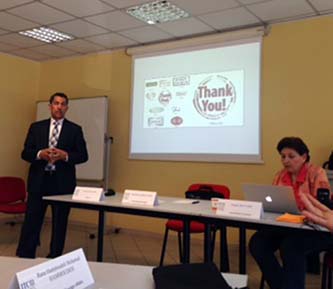“We need journalists to tell the story and tell it well,” Media Unlimited director Magda Abu-Fadil told media graduate students at Lebanon’s Notre Dame University during a Skype discussion on journalism and its transformation.

Abu-Fadil Skypes with NDU students
The virtual seminar “Journalism in the Internet Age: Trends, Tools and Technologies” November 15, 2017 began with a presentation reviewing Abu-Fadil’s evolution from an analog to a digital journalist in a career spanning over four decades.
“Whether you’re using analog or digital tools, what matters is the content,” she told students of Rouba El Helou-Sensenig’s JOU 640 class.

MU director explains her start as an analog, manual journalist
The discussion also focused on adapting journalism skills to incorporate technological changes like Artificial Intelligence (AI), Augmented Reality (AR), Virtual Reality (VR) and Mixed Reality (MR).

Demonstrating the use of a smartphone for mobile journalism
Abu-Fadil explained how newsrooms must reinvent themselves just to keep up.
She said what she could do with a large bag of equipment – cameras, lenses, filters, batteries, rolls of film, recorders, notebooks and more – she can now accomplish with a small smartphone, some pocket-size accessories, and apps.



